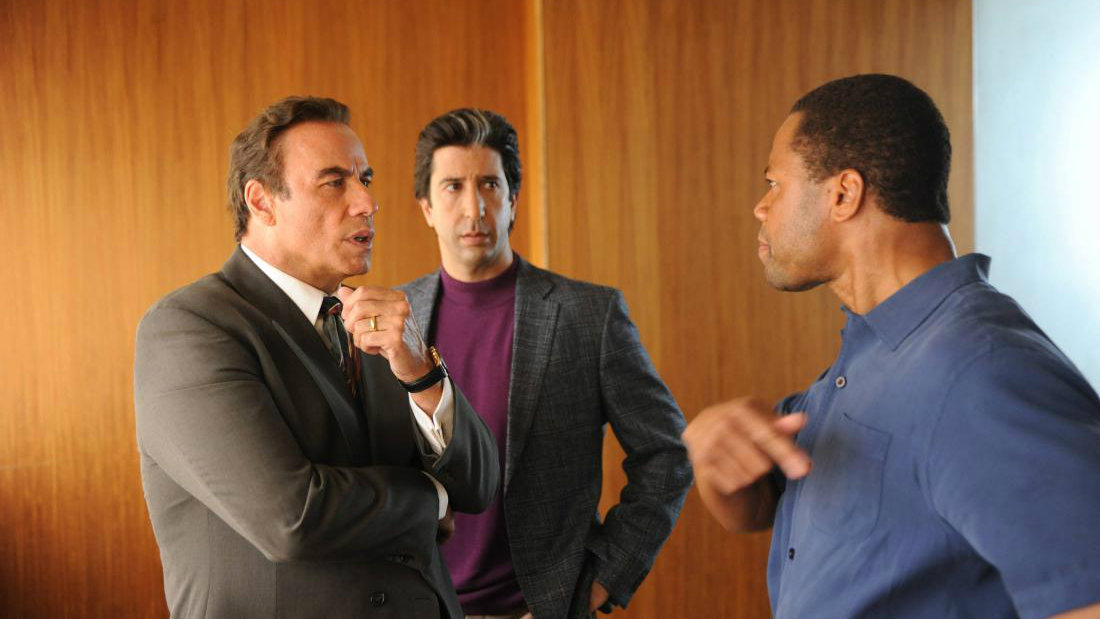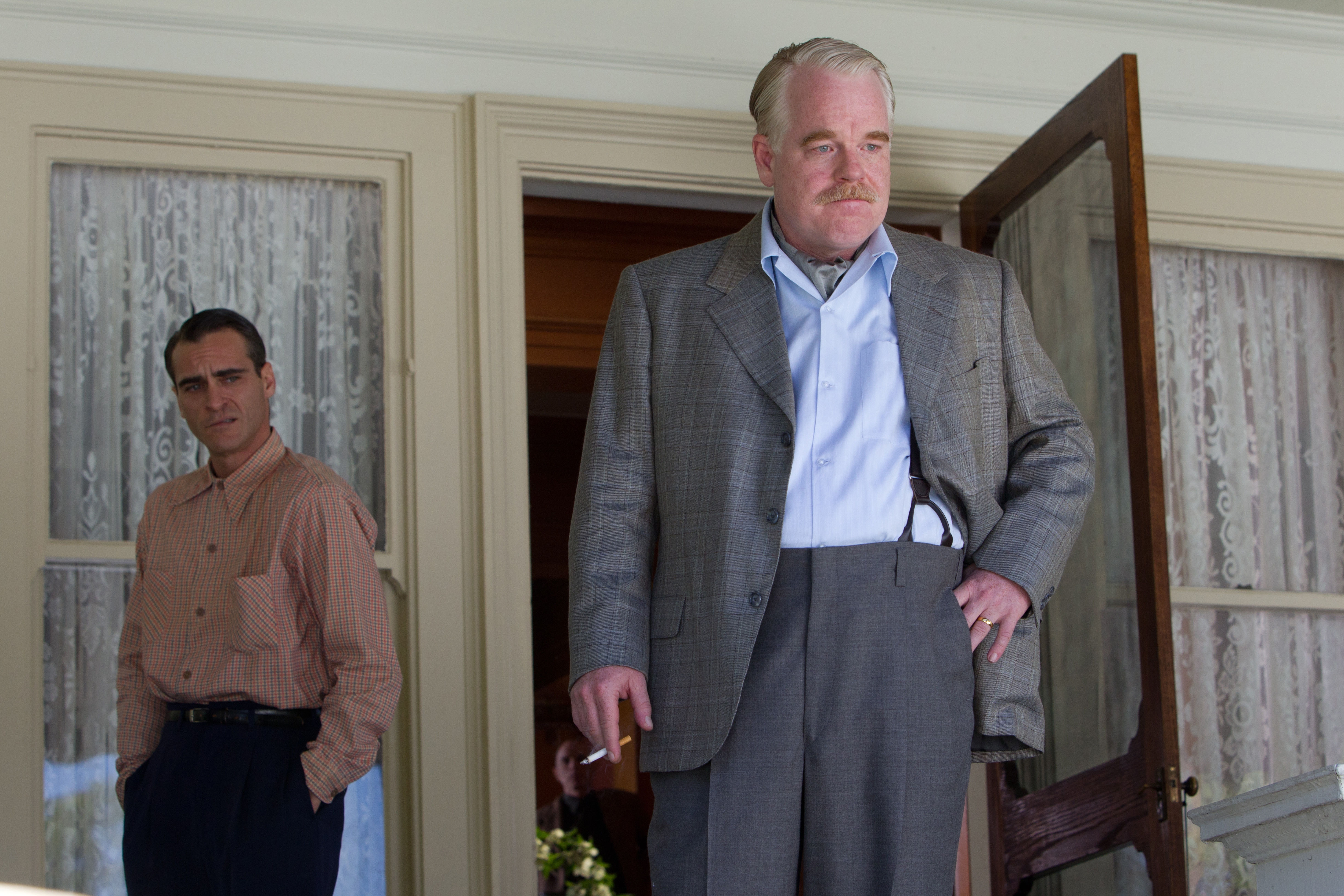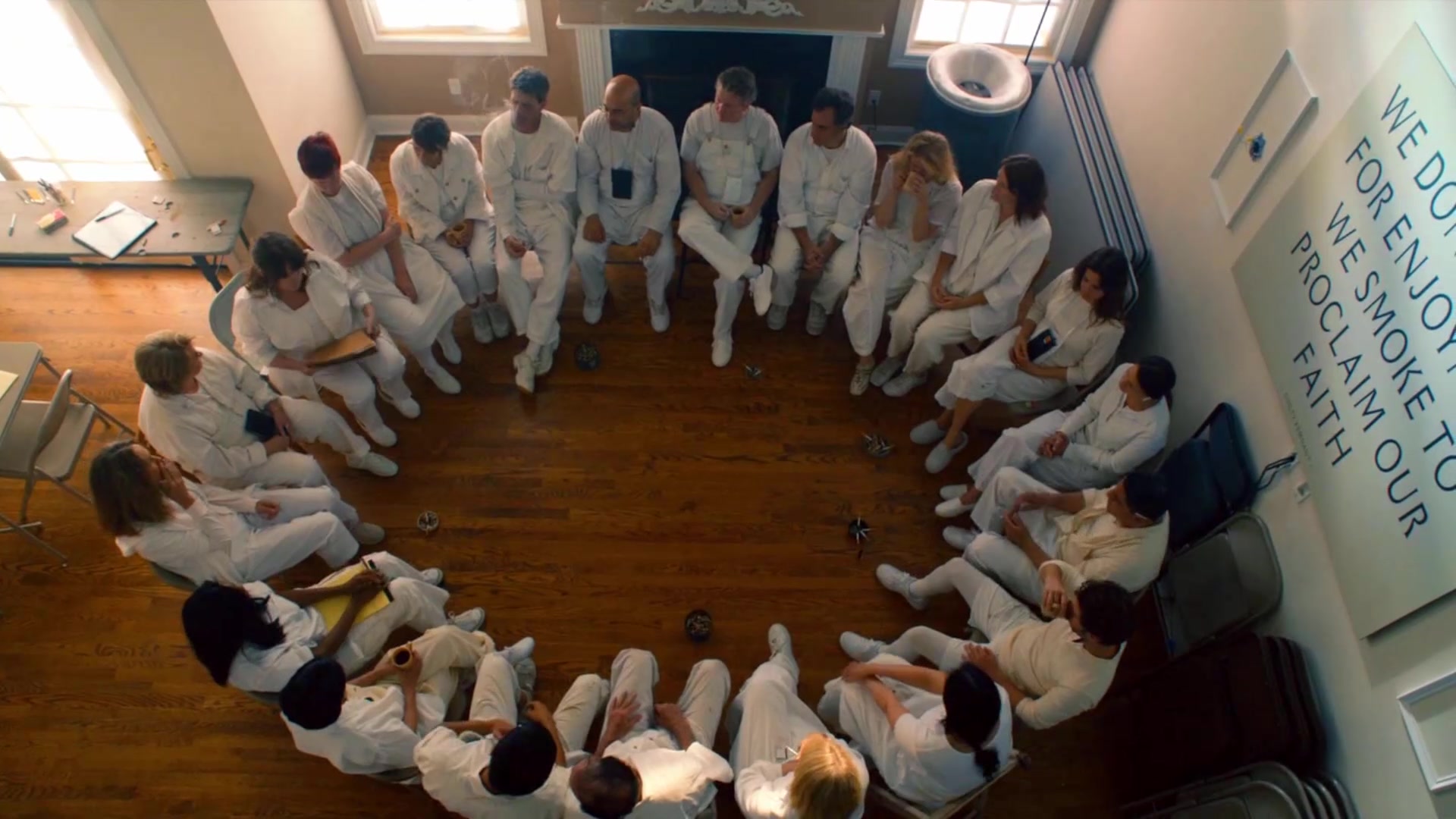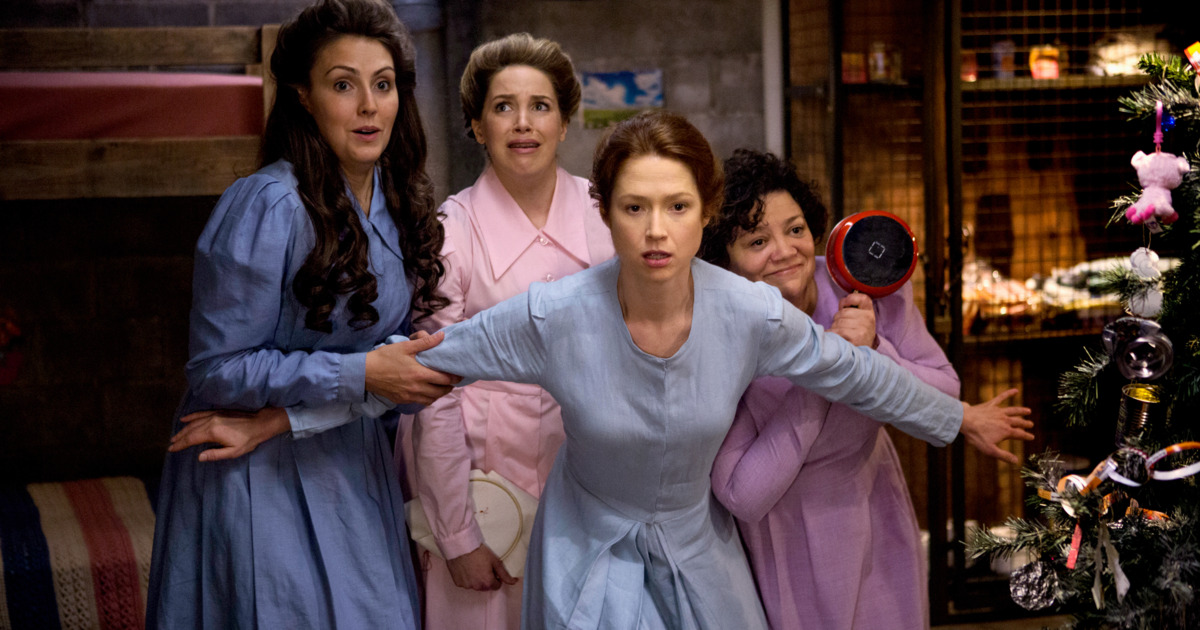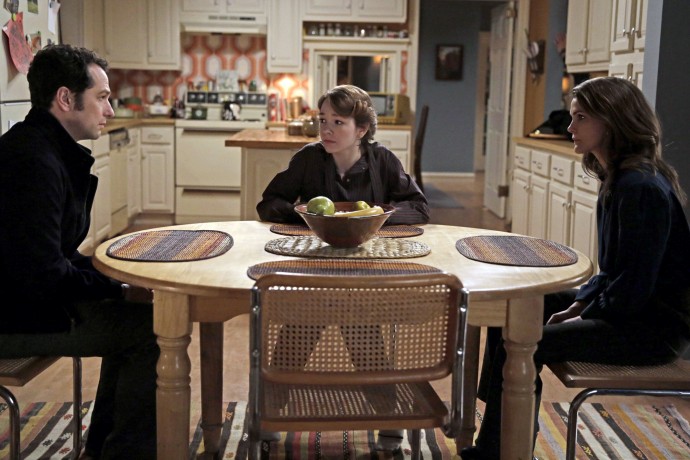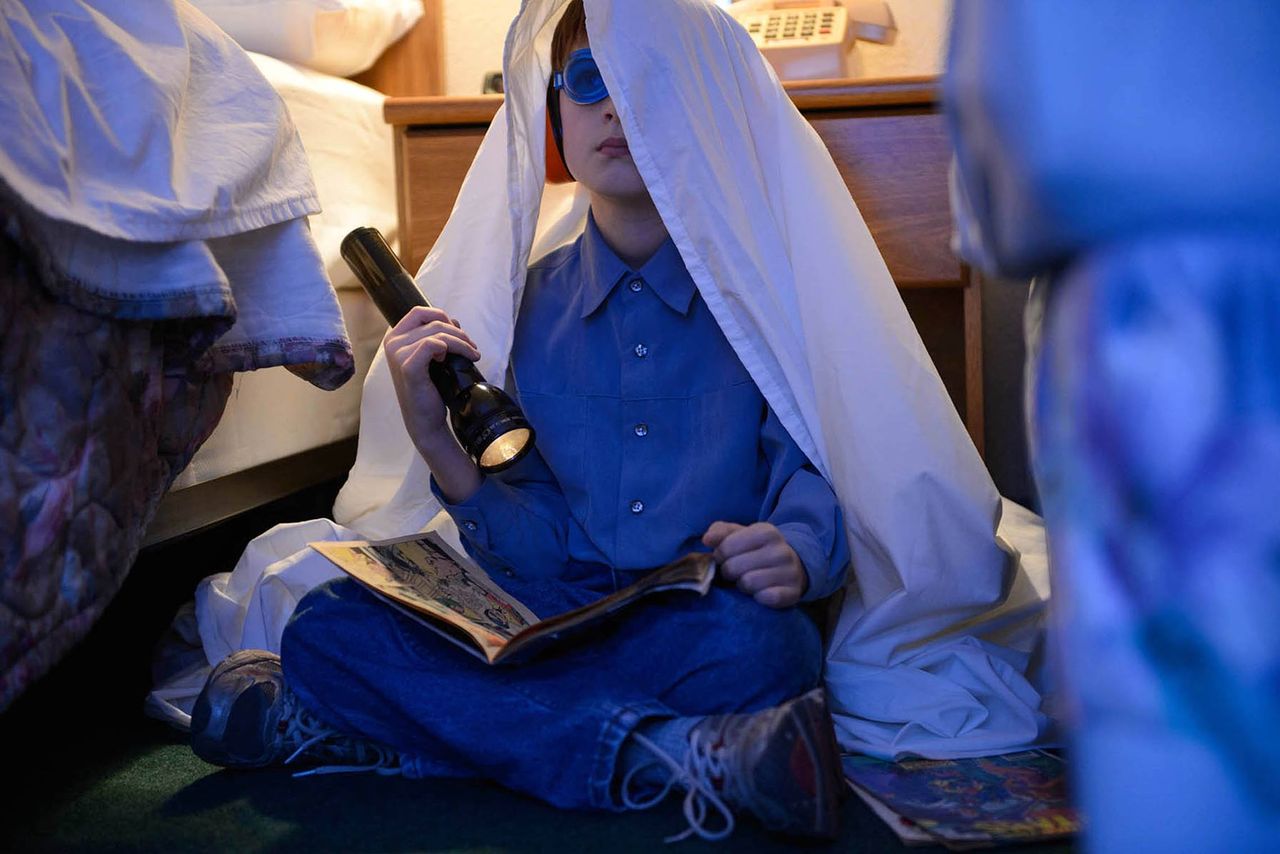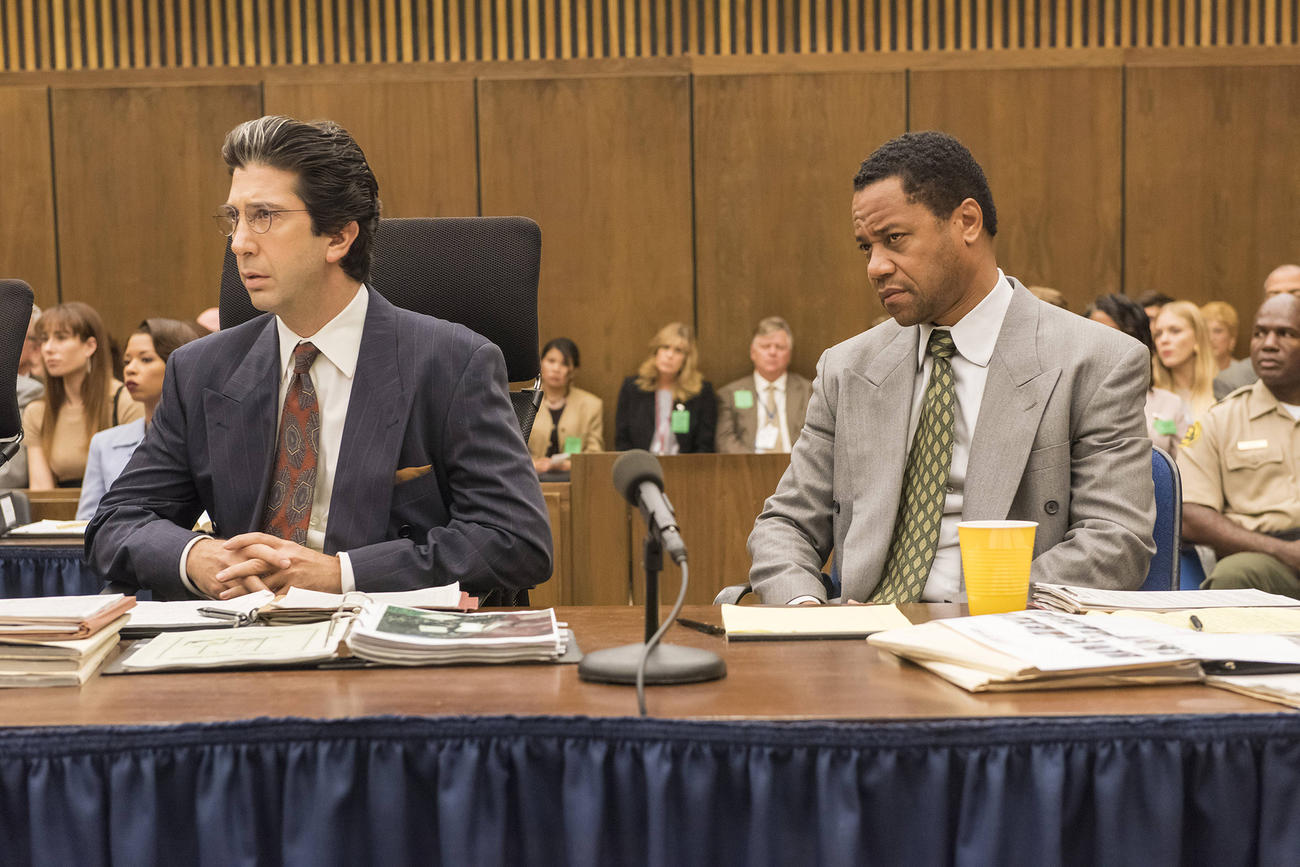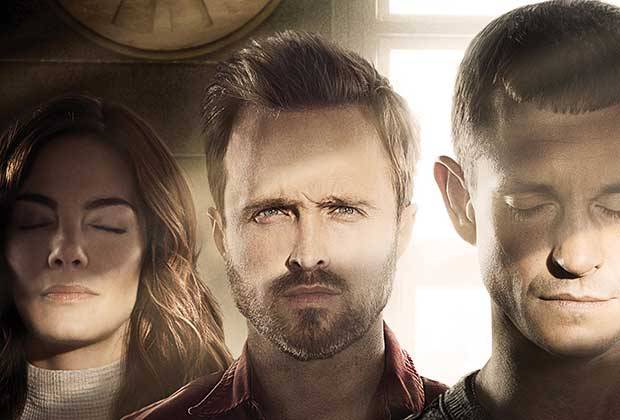Mild spoilers for the first episode of The Path and the first season of The Unbreakable Kimmy Schmidt follow, along with extremely vague plot points for all seasons of The Americans, The People Vs. O.J. Simpson, and The Leftovers.
Near the end of the pilot episode of Hulu’s The Path, Cal (Hugh Dancy) stands on a platform in front of a room full of people, followers of the Meyerist movement, his back to a brightly-lit screen. “This morning, I’m going to tell you the story of Plato’s cave,” he says to the eager crowd.
 Hulu
HuluUsing overheads—for all the world like a sermon you might listen to any Sunday morning in America—he does just that. A group of people have been living in a cave all their lives, he says, watching shadows projected onto the wall by things that have been passing in front of a fire behind them. For the prisoners, the shadows of reality are reality. They’re all they know.
But one day, in Cal’s telling, one guy goes outside and discovers that the shadows are actually just muddled visions of real things that are walking over a bridge. “There is a real, true world out there that his fellow prisoners, his friends—they don’t know,” he says. The man comes back ranting and raving, telling his fellow prisoners that what you think is real is not in fact real.
As Cal tells this story with warmth and charisma, the Meyerists look up at him expectantly, smiling. They are grateful for their enlightened way of living, away from the prisoners of ignorance outside their movement.
But there’s one face in the group—Eddie (Aaron Paul)—for whom the story has a totally different meaning. As the first episode has shown us, Eddie is having doubts about whether Meyerism is real at all. It might be his cave. He might be the prisoner. And then Cal asks the key questions.
“What would the prisoners do?” he asks the crowd. “Would they, if they could, stone this man? Kill him, rather than have their reality destroyed?” As they nod along, he draws out the application questions: “What would you do? Would you choose to remain in your shackles? Would you choose to hold on to your pain and your suffering? Or would you dare to break free?”
They cheer. He smiles. Then he delivers the sucker punch: “Would you dare to let me unchain you and lead you up, up out of the cave?” He benevolently looks at the group. Eddie looks back, eyebrow cocked.
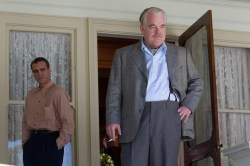 The Weinstein Company
The Weinstein CompanyThat one scene acts like cipher, helping to explain a growing trend in American pop culture: an exploding fixation on stories about cults. For those who’ve escaped them, cults are neither gripping entertainment nor a laughing matter. But that hasn’t stopped everyone else. To name just a few from just the last year: The Unbreakable Kimmy Schmidt, Midnight Special, The Leftovers, The Americans, True Detective, The Path, Holy Hell, Going Clear, My Scientology Movie, Prophet’s Prey, the end of Mad Men—you can even argue that The People Vs. OJ Simpson is a cult story. (More on that in a moment.)
Cults look bizarre by nature to the outsider, and that can’t-look-away weirdness is part of the attraction. It’s telling that Scientology is the cult de jour—two documentaries have opened at major festivals about the strange religion (Going Clear and My Scientology Movie), and a few years ago, P.T. Anderson’s movie The Master starred a Philip Seymour Hoffman character with a suspicious resemblance to L Ron Hubbard. Scientology is expensive and arcane, abusive, secretive, and created by a science fiction novelist. Celebrities like Tom Cruise and John Travolta raise its profile, and audiences don’t feel bad about picking on them.
All Scientology films also home in on the same question: how could people get suckered in? How do ordinary, interesting folks wind up spending their fortunes and decades of their lives in something that sounds bizarre to the outsider?
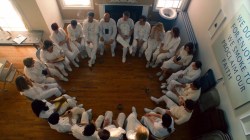 HBO
HBOThe post-Rapture (kinda) drama The Leftovers is full of cults, all of which have sprung up after 3% of the world’s population disappeared, apparently at random. Some characters spend their time battling cults from within, while others stay outside and others just join up, finding rest for their weary souls in someone else telling them what to believe. The Path takes a similar tack, portraying those who join the Meyerists as broken and weary individuals in search of healing and enlightenment.
 Netflix
NetflixThe Unbreakable Kimmy Schmidt opened its first season with an introduction to our heroine, kidnapped as a teenager and imprisoned in an underground bunker by the leader of a bizarre doomsday cult for fifteen years. She is freed, and she moves to New York City. Capers ensue. The first season’s theme is that everyone has their own “bunker” to overcome—but by the finale, Kimmy must confront her former captor, in one of TV’s most fabulous cameos.
In the first season, an episode skewered SoulCycle as a substitute cult, and that theme is revisited early in season 2 (which premieres April 15). No spoilers, but one episode centers around a character who can’t shake the cult—and doesn’t want to. She “needs” a cult to belong to. Her identity comes from the group, not any individual.
 FX
FXOr consider The Americans, which has—from its start—been about faith and religion. It begins by probing its Cold War-era characters' faith in two competing, totalizing systems of belief: the ideology of the Soviets, and the competing blind patriotism of the FBI. As the show has gone on, it’s grown to encompass Christian faith, and, recently, the pop psychology cult of EST. The show handles all of these with a gravity that befits the characters’ own attitudes towards them; as Ruth Graham noted in Slate, “It’s easy to sneer at the opium of the people. But it’s far more interesting to ask why the masses are lighting up.”
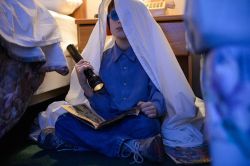 Warner Bros.
Warner Bros.In Jeff Nichols’s sci-fi thriller Midnight Special, the characters escape a cult early on. When we meet them in the first scene, they’re fleeing for safety. But it’s wreaked havoc on their lives, causing them to doubt the world around them.
Even Broad City, a raunchy little comedy about following the beat of your own zany drum, recently repainted SoulCycle (again!) and health-food coops as strange mini-cults.
In their own way, each of these revisits the same question: Why do people join? Why would even native-born citizens trust their government enough to submit to terrible abuse and ethical horror in its service? Why would a smart man seasoned and proficient in deception join a pop psychology cult? What kind of trauma must a person have sustained to join the Guilty Remnant? Why is a “movement” based on “the light” and “the ladder” attractive to natural disaster victims or drug addicts? Why do gorgeous people with the world by the tail follow a weird, enigmatic, abusive leader? Or punish themselves (and their friends) with their devotion to CrossFit or grocery collectives?
And why do we care?
You could argue (maybe rightly) that beneath this obsession is a human longing for organized systems of belief, especially since Americans are less affiliated with institutional religion than ever before. And maybe so.
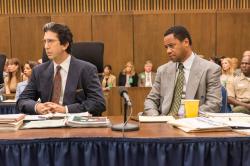 FX
FXBut you get a better sense of the real motivator by observing the eyes of Robert Kardashian, the attorney played by David Schwimmer, on the terrific and just-concluded show The People vs. O.J. Simpson. If there was a cult of O.J.—even setting aside cultic devotion to celebrities, which the show portrays well—then its high priest is Kardashian (who also was a devout Christian, something highlighted with purpose and respect).
Kardashian starts by defending Simpson with every fiber of his being, with blind love, even against evidence. But the camera shows us, repeatedly, the moment when doubt begins to flicker in his mind. It doesn’t take much. And when it breaks across him with too much strength to be ignored, the result is devastating.
That same doubt is embedded in the scene at the beginning of The Path. Cal intends his listeners to see him as the way away from the darkness and into the light. Down in the audience, Eddie is starting to wonder if Meyerism itself isn’t the cave. It’s a loaded sermon, and the rest of the season spends itself on trying to sort out its implications.
What if you believed in something with all your heart, enough to change your life for it—and then found out you were wrong? What if you thought you’d found the light, only to discover it was actually another cave?
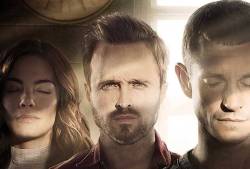 Hulu
HuluWe have so many choices about what or who to believe in, today. From political candidates to religious systems to exercise regimens, we can have it all, and we can surround ourselves with friends and news sources and Twitter accounts and Instagram feeds that reinforce our beliefs while crowding out the others. Because of this, we cling all the more tightly to those whose lead we choose to follow—the cult of Bernie or Hillary or Donald or Ted, of Driscoll or Piper or Meyers or Keller—and sneer, demonize, or patronize those who believe in someone or something else. (Christians are no less guilty of this than anyone else—just look at how non-Christians are portrayed in the God’s Not Dead franchise.)
But in our pop-culture cult fixation—our cult of cults, if you will—we see the resulting anxiety made manifest, right before our eyes. Again and again, we play out our fears about our own beliefs, our own choices. “Cultsploitation” is our way of trying to figure out what we’d do if we found out we were wrong, or how we can avoid getting sucked in, too.
And yet, to believe and belong is a universal human desire; the trick and the virtue is in how we do it. So here’s something interesting: of the shows and films I’ve named (I won’t say which, so as not to ruin the surprise), several turn this proposition on its head. The cult’s system of belief turns out to be the correct one, the one that turns out to accurately describe the world, against all odds.
Which perhaps reveals something else we’re wondering: what if we were to spend our lives laughing at one group of weird “others,” with their strange beliefs and practices—only to discover they were right all along?
Alissa Wilkinson is Christianity Today’s chief film critic and an assistant professor of English and humanities at The King’s College in New York City. She is co-author, with Robert Joustra, of How to Survive the Apocalypse: Zombies, Cylons, Faith, and Politics at the End of the World (Eerdmans, May 2016). She tweets @alissamarie.

